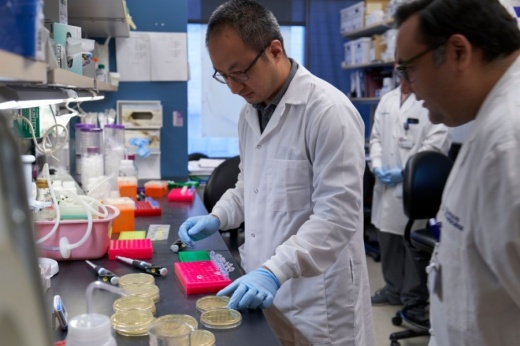The therapy involves the transfer of plasma from donors who recovered from confirmed infections of the new coronavirus to patients currently suffering from COVID-19. The experimental treatment is under evaluation as a possible method to enhance the immune responses of COVID-19 patients using the antibodies found in the blood of the recovered donors, according to researchers at several area hospitals.
The therapy was recently applied in a clinical trial of 25 Houston Methodist patients with severe cases of COVID-19. The hospital said the trial was the first in the nation used for COVID-19 patients.
While not yet approved in the U.S. for widespread treatment of COVID-19, the Houston Methodist researchers noted the therapy has been used in past viral outbreaks as far back as the 1918 Spanish flu pandemic and saw recent success in a small sampling of COVID-19 patients in Wuhan, China. Dr. Eric Salazar, an assistant professor of pathology and genomic medicine at the Houston Methodist Research Institute and the principal investigator on the Houston Methodist trial, noted results from a study on a national 5,000-patient trial released May 14 also suggested the treatment is safe.
"The published literature describing convalescent plasma therapy, in general, seems to indicate that this is a fairly safe treatment option," Salazar said in an email.
Houston Methodist’s initial trial was aimed only at determining the safety of the therapy, rather than its effectiveness as a COVID-19 treatment, and ran from March 28-April 14. In the trial, each of the 25 participants received a single 300 milliliter transfusion of convalescent plasma and were monitored for a two-week span.
Following the trial’s conclusion, Houston Methodist researchers identified the therapy as a safe treatment option for COVID-19 in a May 13 report. In addition to that conclusion, researchers found 36% of the trial participants experienced clinical improvements one week after their transfusions and 76% of the participants had improved or were discharged after 14 days.
The treatment alone was not credited for improvements or recoveries, and researchers wrote factors including the timing, size and number of transfusions would need to be researched further to refine it for COVID-19. Salazar said the hospital is now considering conducting a randomized, controlled trial to evaluate the therapy's effectiveness for COVID-19 treatment.
Salazar said Houston Methodist elected to move forward on the 25-patient trial this spring as part of broader research into possible COVID-19 treatments and because of the hospital system’s access to around 200 recovered patient donors.
“We knew Houston Methodist had the ability to implement a convalescent plasma donor program, and given the lack of targeted treatment options, we felt it was our responsibility to pursue this as rapidly as possible. We were fortunate to have the vision of leaders, including Dr. Marc Boom, and the resources, including a large motivated team with a very diverse skillset, to implement a convalescent plasma donor program,” Salazar said.
Including the clinical trial, Salazar said nearly 100 Houston Methodist patients received a convalescent plasma transfusion and nearly 70 were discharged from the hospital as of May 21.
Similar work is also underway at other hospitals in the region. Thirteen hospitals within HCA Healthcare’s Gulf Coast Division are now participating in a national study to determine if plasma from recovered COVID-19 patients could benefit those currently hospitalized due to the virus.
Those who tested positive for the coronavirus and have since tested negative can donate plasma through the American Red Cross and other donation centers. HCA officials said the convalescent plasma’s antibodies could help the immune systems of individuals currently infected.
Similar approaches have been implemented during outbreaks of coronaviruses such as SARS-1 and Middle East respiratory syndrome, but additional data and donations are needed to determine the effectiveness of treating COVID-19, according to officials.
Officials have encouraged eligible volunteers to donate plasma since early May as part of the study being led by the Mayo Clinic and the U.S. Food and Drug Administration.
“We are proud to take part in this important study,” Chief Medical Officer Mujtaba Ali-Khan said in a statement. “We are asking for the help of our community to spread awareness about plasma donation for patients facing COVID-19 not only in Houston, South Texas and Corpus Christi, but also around the world.”
The University of Texas Health Science Center at Houston and Memorial Hermann also announced their physicians were investigating the experimental plasma treatment in April. In a statement, the health organizations requested plasma from recovered COVID-19 patients and said the donation process for those who qualify would be similar to a standard donation of blood.
“This is one way for the community to work together to combat COVID-19,” said Dr. Henry Wang, a professor and executive vice chair of research in the Department of Emergency Medicine with McGovern Medical School at UTHealth, in the statement.




